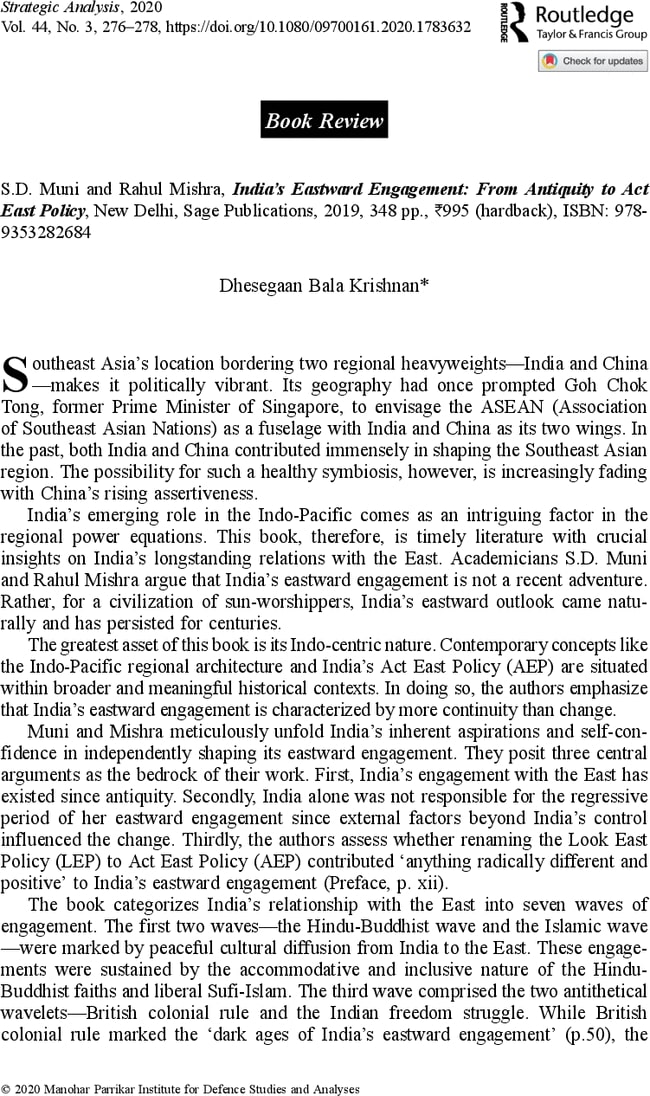Home » Strategic Analysis
COVID-19: Projecting the National Security Dimensions of Pandemics
National security—in its traditional sense—is associated with the protection of the territorial integrity and sovereignty of a state, as well as its critical interests abroad. However, the lethal nature of pandemics is increasingly raising scientific awareness about their national security dimensions.
- Segun Oshewolo , Agaptus Nwozor |
- May 2020 |
- Strategic Analysis
COVID-19: A Testing Time for UAE–India Relations? A Perspective from Abu Dhabi
Responses against COVID-19 have become one of the defining aspects of the modern-day state system that is testing the organic capacity of nations in particular and the international community in general. Even as most have put in place country-specific counter-COVID-19 measures, there is no denying the fact that the pandemic is an existential crisis that can only be dealt with through national efforts combined with substantial regional and international cooperation.
- Arabinda Acharya |
- May 2020 |
- Strategic Analysis
Impact of COVID-19 on the UN Sustainable Development Goals (SDGs)
The global onslaught of COVID-19 pandemic continues as uncertainty swirls around the global economy signalling a slowdown. It is still uncertain how long it will take to arrest the spread of the pandemic and normalcy to be restored. Under the prevailing situation, health has rightly been on the top of the agenda of all the countries which would require scaling up the available health facilities for a robust response. Experts say, until there is a medical solution in the form of vaccine to COVID-19, the health issues will remain the top priority for the governments.
- Md. Manuar Mukarram |
- May 2020 |
- Strategic Analysis
SAARC COVID-19 Fund: Calibrating a Regional Response to the Pandemic
The convening of a video conference of the SAARC leaders by the Indian Prime Minister on March 15 to initiate a regional response to the COVID-19 pandemic came as a surprise to many countries in the region that are fighting the crisis mostly alone, scampering for testing kits, medicines and PPEs and also preparing to deal with the impeding economic crisis.
- Smruti S. Pattanaik |
- May 2020 |
- Strategic Analysis
Georgia 2008: Conflict Dynamics in the Cyber Domain
The article focuses on the Five-Day War, which took place between Georgia and the Russian Federation in August 2008. This war provides the first example of use of cyber-attacks during a conventional military engagement.
- Miroslav Mareš , Veronika Netolická |
- May 2020 |
- Strategic Analysis
Deepening Critical Infrastructures in Northeast India: People’s Perspective and Policy Implications
Northeast India continues to be an industrially underdeveloped and infrastructurally deficient region. The poor condition of infrastructure in the region demands serious attention. Studies in the region reveal that a people’s perspective of development, i.e., roads, electricity, telecommunications and water, falls rightly within the ambit of critical infrastructure. Critical infrastructure is directly linked to economic development, national security, access and availability of educational and health infrastructure.
- Raile Rocky Ziipao |
- May 2020 |
- Strategic Analysis
Revisiting the Discourse on Strategic Culture: An Assessment of the Conceptual Debates
Strategic culture as a concept is generally understood as pertaining to the influence of the cultural dimension in national strategy. The concept rose to prominence due to the inability of the structural realist theory to explain differences in behavioural patterns among nations. However, a diverse array of perspectives has evolved on the concept, spanning four generations of theorization, giving rise to numerous debates.
- Anand V. |
- May 2020 |
- Strategic Analysis
Ladakh: India’s Gateway to Central Asia
Ladakh is one of the largest administrative units in India, in terms of its territory. Due to its contiguity with Xinjiang and Tibet and its close proximity to Central Asia, and enjoying a central position in the network of overland caravan routes that were linked to the Silk Route, Ladakh acted as an important gateway in the Indo-Central Asian exchange of men, materials and ideas through the ages.
- K. Warikoo |
- May 2020 |
- Strategic Analysis
The Bangladesh Question and World Politics
The gruesome events in East Bengal since March 25, 1971 and their repercussions on India easily constitute the most appalling experience of the society of nations since the end of the Second World War; and the refugee problem is the largest and the worst during the present century. It has few parallels in history. This is all the more shocking because of the context and background in which it happened.
- M. S. Rajan |
- March 2020 |
- Strategic Analysis






